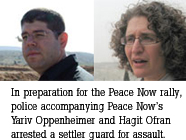You might ask why America's leading Jewish peace organization isn't triumphantly celebrating the resumption of direct peace talks between Israel and the Palestinians.
Americans for Peace Now's response is more measured.
Not that we don't savor the moment. Of course we do. Even after all the failures and disappointments of the past, it's exciting to see the leaders of Israel and the Palestinians sitting down to negotiate peace, face to face, and to do so under the auspices of a US President who clearly remains committed to achieving peace.
At this time, we are less interested in celebrating the opening of talks itself, and more interested in making sure this week's Washington gathering is not merely another ceremony, but the beginning of a process that will yield real results.
Americans for Peace Now's response is more measured.
Not that we don't savor the moment. Of course we do. Even after all the failures and disappointments of the past, it's exciting to see the leaders of Israel and the Palestinians sitting down to negotiate peace, face to face, and to do so under the auspices of a US President who clearly remains committed to achieving peace.
At this time, we are less interested in celebrating the opening of talks itself, and more interested in making sure this week's Washington gathering is not merely another ceremony, but the beginning of a process that will yield real results.
Continue reading A measured welcome to new peace talks.


